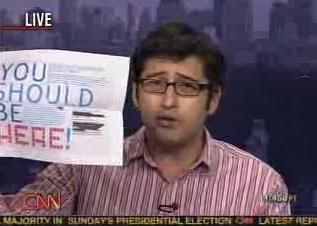Let's be clear about something.
This country is in crisis because the president broke the law.
Americans understand that wiretaps are necessary in the
fight against terrorism. Wiretapping isn’t the real issue.
The issue is a President of the United States who ignores
federal law and orders wiretaps
without obtaining legal
warrants. This is what Bush did and continues to do --
he
has said so himself.
And so far the president and his administration haven’t
been able to answer two essential questions:
1. Why do they need to circumvent the courts?
2. What gives the president the legal authority to do so?
Tim Russert
asked Condoleezza Rice these questions several
times in several ways on Meet The Press and she never
gave a real answer. The best she could do was
claim that
Bush “has authorities that derive from his role as
Commander in Chief and his need to protect the country,”
and then covered her own ass by repeatedly stating she’s
“not a lawyer.”
Really?
The fact is, they can’t provide answers to those questions
because there are none -- not legal ones anyway.
As Josh Marshall
points out, the court established by the
Foreign Intelligence Surveillance Act has only rejected four
warrant applications during its entire 26-year history. So
you can’t honestly argue that warrants are too difficult to
obtain.
But what about the issue of timeliness? You know, the
whole “ticking timebomb” doomsday scenario. “We can’t
wait for a warrant,” they say. “We’ve got to go after the
bad guys
right now.”
Again, Josh
writes:
The problem with this argument is that the FISA
Court is specifically designed to get warrants
okayed really quickly and it almost never rejects
a government application...
It turns out that FISA specifically empowers the
Attorney General or his designee to start
wiretapping on an emergency basis even without
a warrant so long as a retroactive application is
made for one "as soon as practicable, but not
more than 72 hours after the Attorney General
authorizes such surveillance." (see specific
citation, here).
Got that? It’s perfectly legal for the government to
immediately begin wiretapping anybody they want -- as long
as they obtain a warrant within the following 72 hours.
When you consider these facts, it becomes clear that the
only logical reason for circumventing this process is that
Bush doesn’t want the courts to know who his administration
is spying on. And that’s why the alarms are going off in congress,
in the press, and in homes all across the country.
Our nation is now faced with a solemn choice. Do we live
in a democratic republic that respects the Constitution
and holds our leaders accountable for their actions? Or do
we abdicate those rights and responsibilities, choosing
instead to live in a nation governed by blind loyalty and
irrational fear? Time is running out. The president has laid
his cards on the table. It’s all up to us now. Are we in or out?










